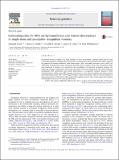Contrasting roles for DNA methyltransferases and histone deacetylases in single-item and associative recognition memory
Abstract
Recognition memory enables us to judge whether we have encountered a stimulus before and to recall associated information, including where the stimulus was encountered. The perirhinal cortex (PRh) is required for judgment of stimulus familiarity, while hippocampus (HPC) and medial prefrontal cortex (mPFC) are additionally involved when spatial information associated with a stimulus needs to be remembered. While gene expression is known to be essential for the consolidation of long-term recognition memory, the underlying regulatory mechanisms are not fully understood. Here we investigated the roles of two epigenetic mechanisms, DNA methylation and histone deacetylation, in recognition memory. Infusion of DNA methyltransferase inhibitors into PRh impaired performance in novel object recognition and object-in-place tasks while infusions into HPC or mPFC impaired object-in-place performance only. In contrast, inhibition of histone deacetylases in PRh, but not mPFC, enhanced recognition memory. These results support the emerging role of epigenetic processes in learning and memory.
Citation
Scott , H , Smith , A E , Barker , G R , Uney , J B & Warburton , E C 2017 , ' Contrasting roles for DNA methyltransferases and histone deacetylases in single-item and associative recognition memory ' , Neuroepigenetics , vol. 9 , pp. 1-9 . https://doi.org/10.1016/j.nepig.2017.02.001
Publication
Neuroepigenetics
Status
Peer reviewed
ISSN
2214-7845Type
Journal article
Description
This work was supported by the Biotechnology and Biological Sciences Research Council (BBSRC) [grant number BB/I00310X/1]. HS and AES were supported by Medical Research Council (MRC) Doctoral Training GrantsCollections
Items in the St Andrews Research Repository are protected by copyright, with all rights reserved, unless otherwise indicated.

